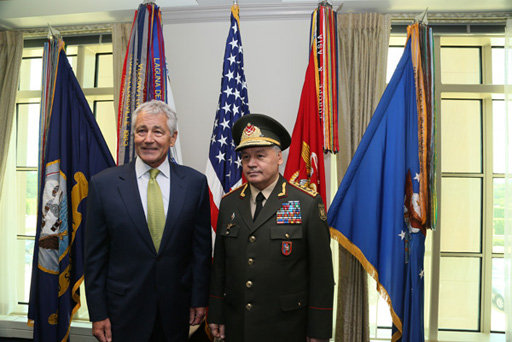Azerbaijani, US defense chiefs discuss cooperation

By Sara Rajabova
More than one million people became refugees and internally displaced persons in Azerbaijan as a result of Armenia's aggressive policy, Azerbaijani Defense Minister Safar Abiyev has said on a visit to the United States.
"Azerbaijani territories have been under occupation for 20 years now. US and international organizations apparently make no distinction based on international law between the aggressor and the country under occupation," Minister Abiyev said at a meeting with US Secretary of Defense Chuck Hagel in Washington.
Speaking about the military-political situation in the Caucasus region, Abiyev said Armenia's occupation policy has resulted in more than one million people becoming refugees and IDPs in Azerbaijan.
"However, unfortunately, international organizations and leading countries have not yet declared Armenia as an invading country," he said.
Abiyev also cited the problems that had emerged due to the introduction of Section 907, stressing that it runs counter to the U.S. foreign policy.
Section 907 to the Freedom Support Act, which was passed by the U.S. Congress in 1992, bans direct aid to the Azerbaijani government.
In October 24, 2001, the Senate granted the U.S. President the powers to waive Section 907. That waiver has been exercised every year since 2002.
Abiyev added that if the Nagorno-Karabakh conflict is not resolved and the Azerbaijani territories are not freed, the region will continue to face a difficult military situation.
The Nagorno-Karabakh conflict emerged in 1988 when Armenia made territorial claims against Azerbaijan. Since the lengthy war in the early 1990s that displaced over one million Azerbaijanis, Armenian armed forces have occupied over 20 percent of Azerbaijan's internationally recognized territory, including Nagorno-Karabakh and seven adjacent regions. Long-standing efforts by US, Russian and French mediators have been largely fruitless so far.
Touching upon various aspects of Azerbaijan-U.S. strategic partnership, Minister Abiyev emphasized practical steps in the establishment and development of relations between the two countries.
He added that positive results have been achieved in the development of cooperation in a number of programs in the field of defense between the U.S. and Azerbaijan.
The minister stressed that Azerbaijan will continue to contribute to the operations in Afghanistan after 2014, noting that this willingness was supported by NATO.
Joining efforts in combating international terrorism as well as joint participation in the international coalition operations are of great importance in strengthening bilateral cooperation, Abiyev said during the meeting.
Abiyev noted the work done by Azerbaijan in the context of Euro-Atlantic security and said that energy, transport, communications and other regional projects undertaken in this area have turned into an important factor in the development of strategic cooperation.
Secretary Hagel, expressing his agreement with his Azerbaijani counterpart, said he will make further efforts for the development and strengthening of strategic cooperation between the two countries. The ministers discussed military cooperation.
He thanked Abiyev for his country's support to the international efforts in Afghanistan, including the sustained deployment of Azerbaijani forces with the NATO-led International Security Assistance Force (ISAF) and also for the valuable role the country plays in providing ground, air and sea transit access for logistical support to Afghanistan, according to the Pentagon's website.
Hagel added that positive results have been achieved in the development of cooperation under a number of programs in the field of defense between the U.S. and Azerbaijan.
After the meeting, Hagel asked the minister to convey his greetings to the President of Azerbaijan.
Abiyev, in turn, invited his US counterpart to pay an official visit to Azerbaijan, and Hagel accepted the invitation.
In a statement summarizing the meeting, Pentagon Press Secretary George Little said that defense ministers agreed to continue to work together on issues to include North Atlantic Treaty Organization interoperability, counterterrorism, defense transformation and maritime security.
Little noted that "Secretary Hagel recognizes Azerbaijan's role in fostering regional security and stability and he looks forward to continuing the strategic partnership."
On the same day, Minister Abiyev had a meeting with US Secretary of the Navy Ray Mabus. During the meeting, the parties discussed issues of security in the Caspian region and the cooperation between the naval forces of the two countries.
Meanwhile, Pentagon officials said the United States assists in development of NATO interoperable units in Azerbaijan, including its Peacekeeping Battalion, which has deployed forces in support of international operations in Kosovo and Iraq, and fields troops in Afghanistan under the International Security Assistance Force.
Azerbaijan also provides key ground, air, and transit access for the logistical sustainment of international efforts in Afghanistan as part of a complex network of supply lines, playing an important role in the diversification of those supply lines, officials said.
Recall that last month, deputy assistant secretary of defense for Russia, Ukraine and Eurasia, Evelyn Farkas led bilateral defense consultations with Defense Ministry officials in the Azerbaijani capital of Baku.
The Azerbaijani Defense Minister's meetings were also attended by Azerbaijani Ambassador to the United States Elin Suleymanov.
The Azerbaijani Defense Minister, who visited Washington at the invitation of American colleagues, laid a wreath at the Tomb of the Unknown Soldier at the Arlington cemetery prior to the talks at the Pentagon.
Here we are to serve you with news right now. It does not cost much, but worth your attention.
Choose to support open, independent, quality journalism and subscribe on a monthly basis.
By subscribing to our online newspaper, you can have full digital access to all news, analysis, and much more.
You can also follow AzerNEWS on Twitter @AzerNewsAz or Facebook @AzerNewsNewspaper
Thank you!
